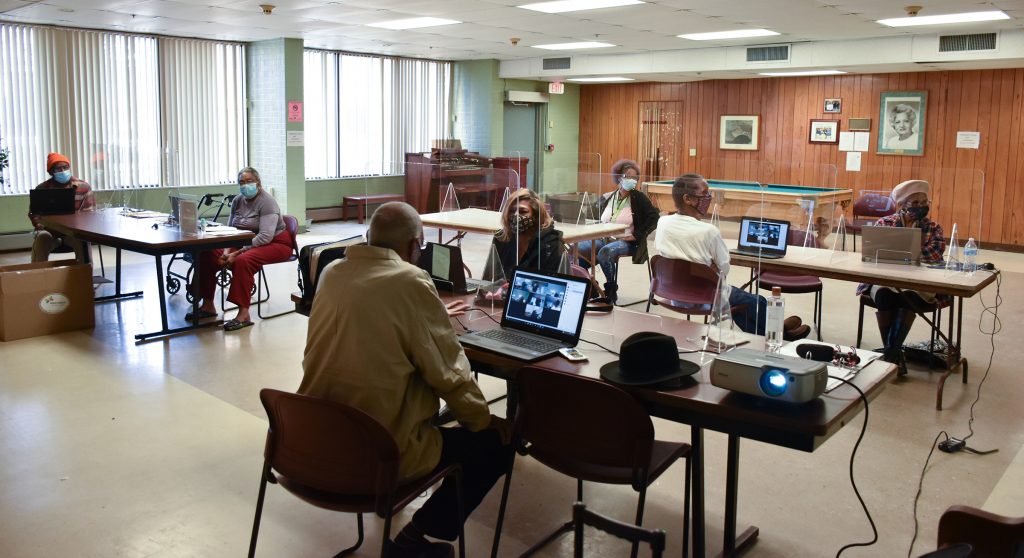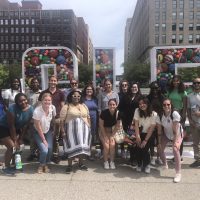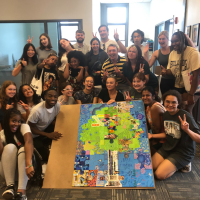The Ashbury Senior Computer Community Center (ASC3) started with a simple question.
In the early 2000s, as people were connecting to the internet in greater numbers, small business owner and long-time community activist Wanda Davis saw that many of her fellow residents in Cleveland’s Glenville neighborhood seemed slow to adopt emerging technology.
Davis started visiting community groups and issued a simple survey to as many of her neighbors as she could, asking the question, “Would you be more interested in learning how to use computers and surfing the Internet if you had access to a local community-based tech center to help teach you how to do so?”
Davis said the response was overwhelmingly positive, and in 2002, she and a dedicated team established ASC3 to provide education, resources and technology literacy training to help more Greater Clevelanders participate in the digital world.
To date, the organization has trained more than 8,000 residents, offering a variety of free services and digital literacy classes that cover basic to advanced skills in areas including email, internet navigation and online safety, and financial literacy. Additionally, ASC3 teaches Microsoft Office programs, web-based conferencing such as Zoom, and health literacy including telehealth services and personal health records (PHRs). ASC3 aims to give people the knowledge and tools they need to confidently connect and navigate efficiently.
Even before the COVID-19 pandemic pushed more of our lives online, Greater Cleveland’s digital divide was well documented. According to the American Community Survey 2015-2019, more than one in five households in Cuyahoga County have no internet access of any kind, with more than half of Cleveland households that make less than $20,000 completely disconnected from the digital world. Additionally, more than half of Cleveland residents over the age of 65 have neither a home computer nor internet access.
As the pandemic forced closures of publicly accessible connectivity havens like libraries and coffee shops, many Clevelanders found themselves locked out of the new, nearly all-virtual world, unable to complete schoolwork, access PHRs, conduct telehealth appointments, stay in touch with loved ones, search for jobs, and apply for unemployment or other vital government services.
“COVID-19 removed the blinders and exposed the world to the issues we’ve been raising for years,” said Davis, who leads ASC3 as the organization’s executive director. “Access to technology, and the understanding of how to use that technology, is crucial.”
When the pandemic arrived in Ohio, the organization quickly pivoted, adapting its programming to virtual models so it could continue serving its client base through last spring’s shut down—helping people get online at a time when they needed it most. Now, more than a year into the pandemic, they’re back in their classroom on Ashbury Avenue—with reduced class sizes—and continuing to operate the Hotline for Internet Information initiative they launched in response to the pandemic.
According to Davis, a lack of trust continues to be a barrier to connectivity in our communities. “People, and in my opinion, especially seniors, need to feel comfortable and be able to trust their source of information,” she said. “They might not want to go to a library or a community college for a class, or transportation could be another barrier. However, a small, neighborhood community tech center, where there are people who look just like them, who have been around for years—can be better positioned to foster that trust.”
And while the pandemic may have heightened attention around Cleveland’s digital divide, quality connectivity and digital savvy will be critical for all communities to thrive once the pandemic is behind us, Davis added.
“The digital world is here to stay,” she said. “Many of the jobs of the future are going to have virtual components. We need to keep bringing technology resources into our communities so they can take part and excel in the digital world.”
To advance that goal, the Ashbury Senior Computer Community Center is one of the six grant recipients representing communities throughout the United States that has been selected to participate in the Ujima Project, in partnership with the National Digital Inclusion Alliance (NDIA) and Grow with Google. The funding will allow them to use Grow with Google resources to teach digital skills to help community members grow their careers and businesses.
Want to help? Support ASC3 here.
Learn more about digital equity initiatives in Greater Cleveland.



